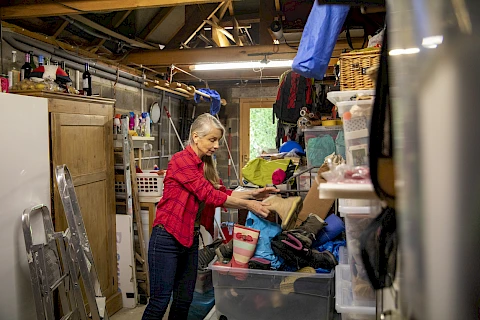
Hoarding is a serious issue that can affect anyone, but it is especially concerning for older adults. As seniors age, they might accumulate a lot of possessions, sometimes to the point where their living space becomes cluttered and unsafe. Addressing hoarding behaviors in seniors is vital because it can significantly impact their health and well-being.
The Physical Dangers of Hoarding
Hoarding isn't just about having a messy home; it can lead to severe physical dangers, particularly for seniors.
Increased Risk of Falls
One of the most significant risks is the increased chance of falling. Excessive clutter can block walkways and make it difficult to move around safely. Falls are particularly dangerous for seniors because they can lead to injuries that take longer to heal, or in some cases, lead to permanent disability.
Fire Hazards
Hoarded items can also create fire hazards. Stacks of papers, clothes, or other flammable materials can easily catch fire, making it difficult to escape in an emergency. Many hoarded homes also have blocked exits, which can be deadly in the event of a fire.
Unsanitary Living Conditions
Finally, unsanitary living conditions can arise from the clutter. Piles of items make it difficult to clean properly, leading to the growth of mold, dust, and even pests. These conditions can cause various health problems, including respiratory issues and infections.
The Emotional and Social Impact of Hoarding
Hoarding in seniors doesn't just affect their physical health; it takes a toll on their emotional and social well-being as well.
Social Isolation
Seniors who hoard often become socially isolated. They might feel embarrassed about their living conditions and avoid having visitors. This isolation can lead to loneliness and further exacerbate mental health issues.
Mental Health Issues
Hoarding is often linked to mental health problems such as anxiety, depression, and stress. The clutter can make daily living overwhelming and lead to a sense of hopelessness. The more clutter there is, the harder it becomes to tackle the problem, creating a vicious cycle.
Strain on Relationships
Hoarding can also strain relationships with family and friends. Loved ones might feel frustrated or helpless, not knowing how to support the senior. This can lead to tension and conflict, making the situation even more challenging to address.
Identifying Hoarding Behaviors in Seniors
Recognizing the signs of hoarding in seniors early on can make a big difference in addressing the problem before it gets out of hand. Look out for these common signs:
- Difficulty parting with items, regardless of their value
- Excessive accumulation of possessions
- Clutter that makes living spaces unusable, such as kitchens or bathrooms being filled with items
- Distress or indecision about throwing things away
Early intervention is crucial in managing hoarding behaviors. The earlier you address the issue, the easier it will be to resolve it. Ignoring the problem only allows it to grow, making it more difficult to tackle later on.
Discover Personalized Senior Care
Hoarding is a serious issue that can have profound physical, emotional, and social impacts on seniors. It increases the risk of falls, fires, and unsanitary living conditions, while also contributing to social isolation and mental health problems. However, with early intervention and the right resources, it's possible to manage hoarding behaviors effectively.
If you or a loved one in the Philadelphia, Elkins Park, Cheltenham, or Wynnewood area need assistance with many home care tasks, including cleaning and decluttering, contact us at Senior Helpers Greater Philadelphia for compassionate and professional support.